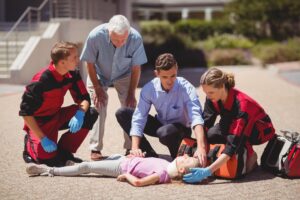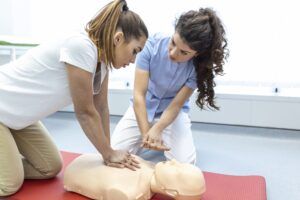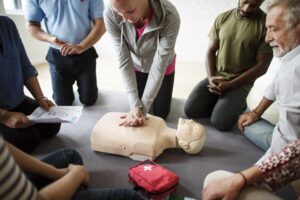In today’s world, security has become more important than ever. Whether it’s protecting homes, businesses, or public spaces, advancements in technology have changed the way we keep ourselves safe. Gone are the days when security meant just locking doors and hiring guards. Now, tools like Artificial Intelligence (AI), Closed-Circuit Television (CCTV), and drones are transforming the security industry.
At Multisec Training, we believe that understanding these technologies is key for anyone working in security. Whether you are a security guard, manager, or business owner, knowing how these tools work can help you make smarter decisions to protect people and property.
In this blog, we will explore how AI, CCTV, and drones are reshaping safety, what benefits they offer, and how they are changing the future of security.
Table of Contents
ToggleThe Growing Role of Technology in Security
Security technology has advanced rapidly over the past decade. While human security guards remain vital, technology now acts as a powerful partner to keep areas safe. These innovations help detect threats faster, reduce human error, and cover larger areas with fewer resources.
The combination of technology and human skills creates a stronger security system. For example, a security guard monitoring CCTV footage can respond quicker to suspicious activity because the cameras provide real-time information. Similarly, AI can analyse data faster than any person, spotting patterns and risks early.
The security industry continues to evolve, and technology is at the forefront of this change.
How AI Is Changing Security
Artificial Intelligence (AI) refers to computer systems that can perform tasks usually requiring human intelligence. In security, AI helps by analysing data, recognising faces, detecting unusual behaviour, and predicting threats before they happen.
AI and Facial Recognition
One of the most talked-about uses of AI in security is facial recognition. Cameras equipped with AI software can scan faces in real time and match them against databases of known individuals. This helps quickly identify criminals, missing persons, or people banned from certain areas.
For example, in airports or stadiums, AI-powered facial recognition can speed up security checks and prevent people on watchlists from entering. It also reduces the need for manual checks, making the process faster and safer.
AI for Behaviour Analysis
AI doesn’t just recognise faces. It can also watch for unusual or suspicious behaviour. For instance, if someone is loitering in a restricted area or moving in a way that suggests they might be stealing, AI systems can alert security staff immediately.
This kind of behaviour analysis helps prevent crimes before they happen by enabling faster responses. It can also reduce false alarms, as the AI learns to distinguish between normal and suspicious activity.
AI-Powered Access Control
AI is also improving access control systems. Instead of relying on keys or cards, AI can use biometric data like fingerprints, iris scans, or even voice recognition to grant or deny access. These systems are more secure and harder to fake than traditional methods.
AI can also track who enters and leaves a building in real time, giving security teams better control over the premises.
Benefits of AI in Security
- Faster detection and response: AI processes data instantly, helping catch threats early.
- Reduced human error: Machines don’t get tired or distracted.
- Scalability: AI systems can monitor many cameras or sensors simultaneously.
- Improved accuracy: AI improves over time by learning from data.
The Importance of CCTV in Modern Security
Closed-Circuit Television (CCTV) has been a security staple for decades. It involves cameras recording video footage that can be monitored live or reviewed later. But today’s CCTV systems are smarter and more advanced than ever before.
How CCTV Has Evolved
Traditional CCTV cameras just recorded footage onto tapes or digital storage. Security guards had to watch screens all day, hoping to spot suspicious activity. This was time-consuming and often ineffective.
Now, CCTV cameras are often linked with AI and network systems. They can stream footage live to multiple devices, store it securely in the cloud, and even alert guards automatically when something unusual happens.
Types of CCTV Cameras
- Fixed cameras: These point in one direction and cover specific areas.
- PTZ (Pan-Tilt-Zoom) cameras: These can move and zoom in to follow action or get a closer look.
- Thermal cameras: These detect heat signatures, useful for low-light or night-time monitoring.
- 360-degree cameras: These provide full panoramic views, covering large spaces without blind spots.
Choosing the right camera depends on the location and security needs.
How CCTV Enhances Security
- Crime deterrence: Visible cameras discourage theft, vandalism, and other crimes.
- Evidence collection: Recorded footage can be used in investigations and court cases.
- Remote monitoring: Security staff can watch multiple locations from a central point.
- Improved emergency response: Instant alerts mean guards or police can react quickly.
CCTV and Privacy Concerns
While CCTV is a powerful tool, it must be used responsibly. Businesses and organisations need to balance security with privacy laws. This includes informing people about surveillance, securing footage properly, and only using cameras in appropriate areas.
Drones: A New Frontier in Security
Drones, or unmanned aerial vehicles (UAVs), are becoming increasingly popular in security because they can access places humans can’t and provide unique aerial views.
How Drones Work in Security
Drones are equipped with cameras and sensors and can be controlled remotely or fly autonomously using programmed routes. They provide real-time video feeds from above, covering large areas quickly and efficiently.
Uses of Drones in Security
- Patrolling large properties: Drones can fly over warehouses, farms, or construction sites to spot intruders or hazards.
- Crowd monitoring: At events or protests, drones help track crowd movements and detect trouble early.
- Search and rescue: Drones can find missing persons in difficult terrain faster than ground teams.
- Disaster assessment: After fires or floods, drones provide aerial views to assess damage and risks.
Benefits of Drones for Security
- Speed and flexibility: Drones reach places faster than foot or vehicle patrols.
- Cost-effective: They reduce the need for multiple guards in large areas.
- Safety: Drones can inspect dangerous or hard-to-reach locations without risking human life.
- Real-time intelligence: Live video feeds give security teams up-to-date information.
Challenges and Regulations
While drones are powerful tools, they come with challenges like limited flight time, weather restrictions, and privacy concerns. Governments regulate drone use strictly, so operators must be trained and licensed to fly them legally and safely.
Integrating AI, CCTV, and Drones for Maximum Security
The true power of modern security lies in combining AI, CCTV, and drones into one integrated system. When these technologies work together, they create a layered defence that is much stronger than any single tool alone.
For example:
- AI analyses CCTV footage to detect unusual behaviour and immediately sends alerts.
- Drones can be dispatched automatically to investigate areas where CCTV cameras detect movement at night.
- AI-driven access control limits entry to authorised personnel only, while cameras monitor who comes and goes.
This integration means faster detection, better coverage, and smarter responses to threats. It also helps security teams work more efficiently, focusing their attention where it’s needed most.
What This Means for Security Professionals
Technology is changing the role of security guards and professionals. Instead of only patrolling or watching screens, guards now work alongside intelligent systems that help them do their jobs better.
The Importance of Training
To get the most from these new tools, security personnel must be trained properly. Understanding how AI works, how to operate and monitor CCTV systems, and how to deploy drones safely are vital skills for the modern security workforce.
At Multisec Training, we offer specialised courses that prepare security guards to work with the latest technologies. Our training helps you stay ahead of the curve and be ready for the future of security.
The Human Touch Remains Key
While technology is powerful, it cannot replace the human touch. Security guards bring judgement, empathy, and decision-making skills that machines cannot replicate. Technology supports guards by providing better information and tools but doesn’t replace their presence.
Looking Ahead: The Future of Security Technology
The future of security will see even more advanced technology. Some trends to watch include:
- AI-powered predictive security: Systems that not only detect but predict crimes before they happen using data analysis.
- Robotic security guards: Autonomous robots that patrol and interact with people.
- Smart cities: Integrated security networks across entire cities, linking cameras, sensors, and emergency services.
- Improved drone capabilities: Longer flight times, better sensors, and greater autonomy.
These innovations will continue to reshape how we protect people and property, making security smarter, faster, and more efficient.
Conclusion
Technology like AI, CCTV, and drones is transforming security in exciting ways. These tools help detect threats faster, cover more ground, and support security professionals in keeping people safe. By embracing these advancements and combining them with skilled human guards, the future of security is stronger than ever.
If you want to learn more about how technology is changing security or want to train in these new skills, visit Multisec Training. We offer up-to-date courses designed to prepare you for the modern security landscape.
Stay safe and stay ahead with the power of technology!





